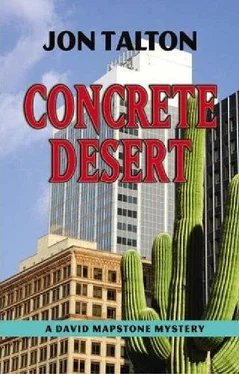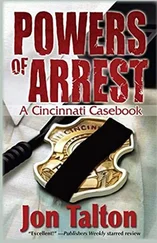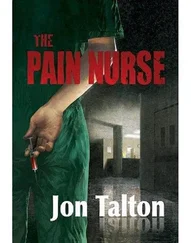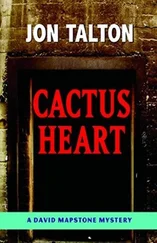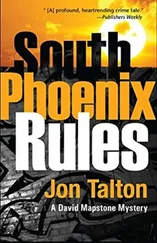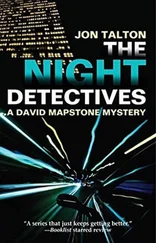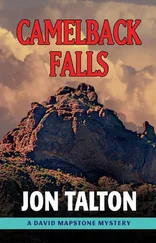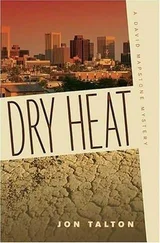Jon Talton - Concrete Desert
Здесь есть возможность читать онлайн «Jon Talton - Concrete Desert» весь текст электронной книги совершенно бесплатно (целиком полную версию без сокращений). В некоторых случаях можно слушать аудио, скачать через торрент в формате fb2 и присутствует краткое содержание. Жанр: Полицейский детектив, на английском языке. Описание произведения, (предисловие) а так же отзывы посетителей доступны на портале библиотеки ЛибКат.
- Название:Concrete Desert
- Автор:
- Жанр:
- Год:неизвестен
- ISBN:нет данных
- Рейтинг книги:5 / 5. Голосов: 1
-
Избранное:Добавить в избранное
- Отзывы:
-
Ваша оценка:
- 100
- 1
- 2
- 3
- 4
- 5
Concrete Desert: краткое содержание, описание и аннотация
Предлагаем к чтению аннотацию, описание, краткое содержание или предисловие (зависит от того, что написал сам автор книги «Concrete Desert»). Если вы не нашли необходимую информацию о книге — напишите в комментариях, мы постараемся отыскать её.
Concrete Desert — читать онлайн бесплатно полную книгу (весь текст) целиком
Ниже представлен текст книги, разбитый по страницам. Система сохранения места последней прочитанной страницы, позволяет с удобством читать онлайн бесплатно книгу «Concrete Desert», без необходимости каждый раз заново искать на чём Вы остановились. Поставьте закладку, и сможете в любой момент перейти на страницу, на которой закончили чтение.
Интервал:
Закладка:
Jon Talton
Concrete Desert
Chapter One
The storms don’t come into the city anymore. When I was a little boy, when we had evaporative cooling and Kennedy was president, the late-summer monsoons swept into Arizona from the Sea of Cortez and cooled Phoenix with wind and rain. Now the city has become a concrete slab eighty miles across and the weather has changed. Most times, we can only see the clouds hovering out beyond the mountains, dropping precious rain on the desert, tantalizing us with lightning, leaving us with dust.
It was July. High summer in Phoenix, when a temperature of 105 degrees is a relief and workaday guys in traffic jams can turn into killers if they get into a fender bender. It’s the time of year when the asphalt gets so hot, it can leave second-degree burns on your skin; when $350-a-night resorts hold half-price sales, and everybody who can afford it heads to the ocean; when the air-conditioning of 3 million people pushes the power grid to the edge of a shutdown and a headline about a dozen illegal immigrants suffocating in a locked tractor-trailer brings a resigned shrug. My hometown.
I had been back in Phoenix for exactly six weeks, back in the house that had belonged to my grandparents, the house where I grew up. It was a small Spanish Mediterranean two blocks west of Central on Cypress Avenue, surrounded by oleander hedges, orange trees, and palms. Grandfather built the house in 1924. During the years I was gone, the city had taken to calling the area the Willo Historic District. When I was a kid, it was just a neighborhood and everybody knew everybody else. Now my grandparents had been dead for years, and the families that lived nearby had moved away. The neighborhood was supposed to be popular with young professionals. I hoped so. I needed to sell the house and find a new job.
It was a Sunday evening, the worst time of the week to be alone. Ellington was on the CD player, the 1956 Newport concert. I was about half a martini away from loose ends when the wind started to unsettle the palm trees outside the big picture window and the doorbell rang. Maybe I’d been a little isolated for those six weeks, but it occurred to me that I hadn’t heard the doorbell for years, at least since Grandmother was still alive. The deep clang put a stake of dread in me that usually comes with late-night phone calls. Then I opened the door and saw a ghost.
“David Mapstone!” The ghost knew my name and rushed to give me a hug. At five feet five, she could fit completely inside my arms and have the top of her head nestle under my chin. Once upon a time, her name had been Julie Riding, my first lover.
I blathered the nervous small talk of unexpected reunions and invited her inside. In the high-ceilinged living room, she sat in one of the leather chairs that face the picture window and accepted my offer of a drink-scotch, neat. I poured her a couple of fingers of McClelland’s and then sat opposite her in the other chair with my glass of Bombay Sapphire.
“I can’t believe you’re back in town,” she was saying in a bright alto chirp. She wore a short summer dress that was a little too young for her. But she still had damn nice legs and she knew it. Her hair was a couple of shades darker than the honey color that I remembered, and it was shorter now, businesslike, above the shoulders. Time was beginning to cut itself into the skin around her eyes, but they were still the darkest blue I had ever seen, the color of the dusk sky in the mountains. She was saying how little the house had changed, how she was sorry to hear about my grandmother’s death a few years before, how she’d tried to keep up with my teaching career after I left town.
Then she turned red and downed the scotch in one gulp. I refilled her glass, and she didn’t stop me.
“Shit,” she said, the chirp gone from her voice. “I rehearsed this speech a few hundred times, but I know it sounds forced. I know how strange it seems for me just to show up suddenly, when I walked out the way I did. Now, here I am. Wanting something.”
I filed that away. “I just thought you’d been held up a really long time in the ladies’ room.”
“David, it’s been twenty years.”
My head is always full of dates-1066, 1492, 1789, 1914. It’s an occupational hazard when you teach history. The last time I saw Julie Riding was just before Christmas 1979, when she sat across from me in a dark little bar near the university and said she didn’t want to see me anymore. She was in love with someone else, she said. He was older and-let me remember this right-“was a real world-beater,” which I took to mean he had money. I was just a college student with a smoky old convertible.
For months after that, amid various stages of anger and hurt, I imagined the life Julie was living without me-I have a very vivid imagination-and what I would say and do if she ever came back. But as my life began to change, she faded from my thoughts, until the years pushed her into that fond drawer of occasional memory reserved for first lovers. Now she was here in my living room and part of me was feeling odd, but another part was feeling as if she’d been gone about twenty minutes. Mostly, I was just glad for the company.
“Do you mind?” She produced a Marlboro Light from her purse. I shook my head. She lit it and took a drag that sounded soothing even from where I was sitting. “I’m seriously addicted,” she said.
We sat in silence awhile, watching the clouds and wind flow in from the east; then a curtain of dust began to fall out of the sky. I leaned forward and just let her find her words. She played with her hair, pushing it back. She’d always done that.
“God, you look great,” she said finally. I was wearing jeans and a white polo shirt, nothing special. “No, I mean it. It’s like you’ve really grown into your face. You’re going to be a hell of a good-looking middle-aged man.”
“Thanks, I think,” I said.
“Our birthdays are two weeks apart, remember?” She sipped her scotch and gave me a sly smile. “David, it’s the strangest thing. I was at the Hard Rock Cafe with some girlfriends one night, and there was Mike Peralta at the bar. He wasn’t in uniform, of course, and he looked like he was with some pretty high-powered people, but I just went over and gave him a hug, I mean, my God, it had been about as long as since I’d last seen you.
“Anyway, I asked about you, and Mike said you were back in Phoenix and working for the Sheriff’s Office again. I knew I had to see you, so here I am. My God, are you a deputy again? I thought that was just your youthful adventure.”
She stubbed out the butt and lit another, melting a little into the chair. “Deputy David Mapstone of the Old West.” She giggled.
I smiled at her, glad to provide amusement for an old girlfriend. Some people decide at age fourteen that they’re going to be accountants, and that’s all they do for their whole lives. My resume is a little more complicated. Especially after this summer.
“I’m just doing a little consulting. Researching some old cases for Peralta. I’m in between jobs.”
“So you’re not teaching?” she asked. “Your great dream was to be a history professor, I thought.”
Since when do we get our great dreams? I thought, getting up to refresh our drinks. I said over my shoulder, “The tenure committee at San Diego State didn’t like me, and there are too many people with Ph.D.’s in history, anyway. Something will come up.”
She followed me into the kitchen. “When did you start drinking martinis?”
“When I was married to a millionaire’s daughter.”
“Dorothy Parker said martinis lead to all sorts of sexual misjudgments,” Julie said absently, then added, “What was her name?”
Читать дальшеИнтервал:
Закладка:
Похожие книги на «Concrete Desert»
Представляем Вашему вниманию похожие книги на «Concrete Desert» списком для выбора. Мы отобрали схожую по названию и смыслу литературу в надежде предоставить читателям больше вариантов отыскать новые, интересные, ещё непрочитанные произведения.
Обсуждение, отзывы о книге «Concrete Desert» и просто собственные мнения читателей. Оставьте ваши комментарии, напишите, что Вы думаете о произведении, его смысле или главных героях. Укажите что конкретно понравилось, а что нет, и почему Вы так считаете.
